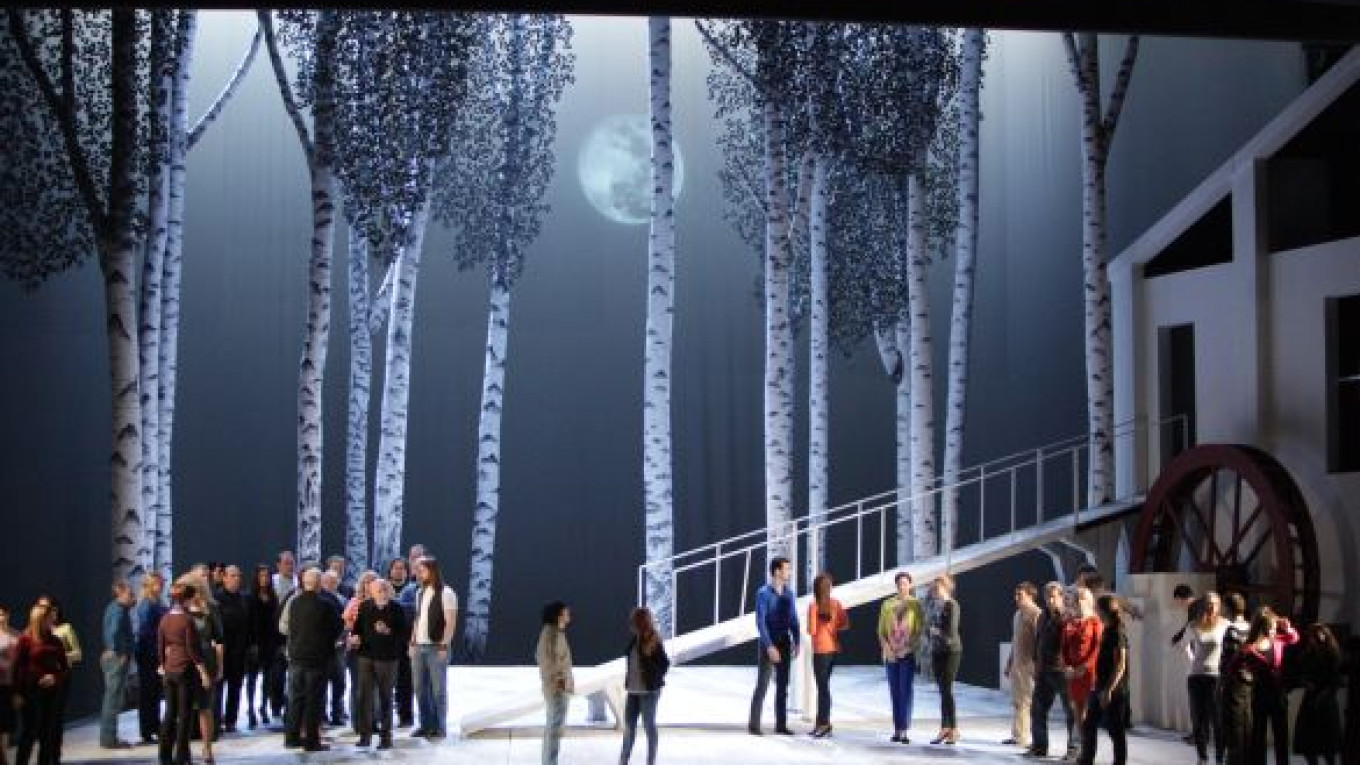For my very first Moscow Times interview, in 1994, I chose a vivacious coloratura soprano from Texas by the name of Laura Claycomb, who at the time was a leading contender for a prize among the female vocalists in that year's Tchaikovsky Competition.
Though she then seemed to me the most talented of the women competing, Claycomb ended up taking only second prize. But in the years since then, she has enjoyed success that has far outstripped that of her rivals who received the competition's first and grand prizes, and she has established herself as one of the world's leading coloraturas. ?
Claycomb has returned to Moscow on several occasions, notably, and with considerable acclaim, to sing in concert performances of Gaetano Donizetti's "Lucia di Lammermoor" and Jacques Offenbach's "The Tales of Hoffmann."
On Wednesday, Claycomb makes her first Moscow appearance in a fully staged opera performance, singing the hugely demanding lead role of Amina in the premiere at the Bolshoi Theater of a new production of Vincenzo Bellini's bel canto era masterpiece ""La sonnambula."
Although some of the music of "La sonnambula" is familiar to nearly every opera lover, the work rather seldom finds its way to the stage. The Bolshoi has produced it only once before, in 1837, six years after its premiere in Milan.
Part of the reason for the opera's relative neglect is the need to find not only a first-rate coloratura for the sleepwalking Amina but also the rare sort of lyric tenor needed for Elvino, Amina's husband-to-be, who, in Claycomb's words, "must be able to sing with delicacy and whose voice can soar into the stratosphere."
Another drawback may be the opera's charming but rather inconsequential story, which revolves around a nearly thwarted wedding in a Swiss village.
What does make ""La sonnambula" a compelling experience is its nearly continuous stream of golden melody combined with its opportunities for virtuoso displays of vocalism. ?
I met with Claycomb just before her first rehearsal in full makeup and costume and found her as full of vitality and enthusiasm, and as unassuming, as when I first encountered her 19 years ago.
Until now, Amina has not numbered among the many bel canto roles in Claycomb's repertoire.
"I've been dreaming of doing Amina for ages," she said. "In the past, I've had three offers to do it, but all of them fell through, mostly due to scheduling problems. It's so exciting to have this finally happen."
As for the character of Amina, Claycomb notes that "there is not a lot of angst in it, except in the final scene. She's just an innocent young girl about to be married, and it's all more about emotion than psychological things."
In preparing for the role, Claycomb has delved into the subject of sleepwalking.
"I've read up on it a lot," she said, "And even watched it on YouTube."
In Amina's case, she believes, the sleepwalking is probably related to her being an orphan.
"The worst thing that can happen to her is to be abandoned," Claycomb said. And thanks to her supposed infidelity, "she is abandoned by everyone, by the entire village."
"There was a great deal of interest in sleepwalking in Bellini's time, but they hadn't yet understood its psychological aspects," she said. ?
Nevertheless, she is impressed by the fact that in the final scene, when Amina sleepwalks her way across a rickety old bridge, Bellini and his librettist apparently realized that you don't try to awaken a sleepwalker until he or she has reached a safe place.
In reintroducing "La sonnambula" after a 176-year absence, the Bolshoi has assembled what looks like a superb team. Singing Elvino at the opening will be South African tenor Colin Lee, who made a stunning Moscow debut last year in Donizetti's "La donna del lago" and, according to Claycomb, has just the right sort of tenor voice for the role.
Staging the opera, as well as designing its sets and costumes, is 82-year-old Pier Luigi Pizzi, one of Italy's most renowned operatic directors.
"Despite his age, he has more energy than all the rest of us put together and regularly works a 12-hour day," Claycomb said.
As conductor, the Bolshoi chose the Italian-Spanish maestro Enrique Mazzola, who made a notable Moscow debut in 1998 leading Gioacchino Rossini's "The Barber of Seville" at Helikon Opera and has since come to be recognized as one of the world's most skilled interpreters of opera from the bel canto era. ?
"The Sleepwalker" ("La Sonnambula") plays March 6-9, March 14-15, July 10-11 and July 13 at 7 p.m., and March 10 and July 14 at 6 p.m., at the New Stage of the Bolshoi Theater, 1 Teatralnaya Ploshchad. Metro Teatralnaya. 8-495-455-5555. www.bolshoi.ru.
Contact the author at [email protected]
Related articles:
A Message from The Moscow Times:
Dear readers,
We are facing unprecedented challenges. Russia's Prosecutor General's Office has designated The Moscow Times as an "undesirable" organization, criminalizing our work and putting our staff at risk of prosecution. This follows our earlier unjust labeling as a "foreign agent."
These actions are direct attempts to silence independent journalism in Russia. The authorities claim our work "discredits the decisions of the Russian leadership." We see things differently: we strive to provide accurate, unbiased reporting on Russia.
We, the journalists of The Moscow Times, refuse to be silenced. But to continue our work, we need your help.
Your support, no matter how small, makes a world of difference. If you can, please support us monthly starting from just $2. It's quick to set up, and every contribution makes a significant impact.
By supporting The Moscow Times, you're defending open, independent journalism in the face of repression. Thank you for standing with us.
Remind me later.


